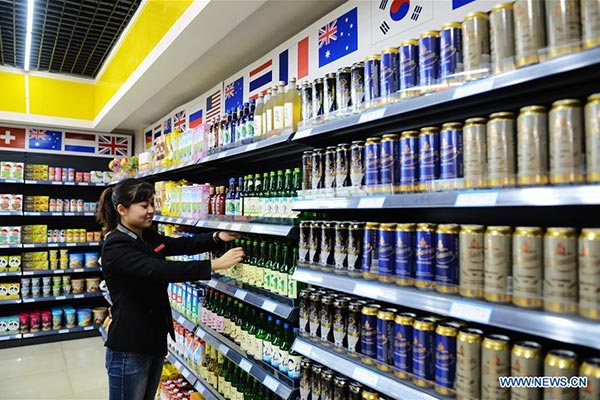New policy for cross-border e-commerce may be delayed
China Daily, May 11, 2016 Adjust font size:
|
|
|
A shop assistant settles articles at a purchase center of imported goods in Shijiazhuang, capital of North China's Hebei province, April 8, 2016. [Photo/Xinhua] |
New tariff policy for cross-border e-commerce may see some new adjustments, which are scheduled to be unveiled in near term, the Shanghai Securities News reported on Tuesday.
The adjustments suggested that the new rules should be postponed for one year. During the one-year transition period, cross-border retailers could make preparation for new regulation.
This comes just one month after China ushered in a new tax policy that requires products bought on cross border e-commerce platforms to be subject to import tariffs.
In fact, it's the third adjustments for the new restrictions on online imports. Earlier, authorities did some fine-tuning in the policy of importing goods for the first time, then, the second batch of "positive list" was unveiled to cover more commodities.
Between Thursday and Saturday, several ministries and other authorities, including the Ministry of Commerce, the General Administration of Customs, and the Ministry of Finance, did some intensive research on the effect of the new policy, and solicited opinions from some online retail websites such as Tmall Global, Jumei.com, vip.com, and xiaohongshu.com.
During the meeting, authorities made clear that the nation will support cross-border e-commerce, with focus on B2B and exports. However, it doesn't mean the development of B2C will be restricted.
A person who attended the meeting held in Henan Friday told Shanghai Securities News that representatives from several cross-border online shopping platforms hope the new rules could be delayed for a while, and the country should define a new trade management category for cross-border e-commerce.
They also hoped that during the implementation of the new policy, a "positive list" can stand for an entry license, and cancel customs clearance certificates.
The adoption of transition period is within expectation, said Zhang Li, deputy director of e-commerce research department under the Ministry of Commerce.
New policy for cross-border e-businesses was adopted too hastily, and the country should take a soft measure and give enterprise some time to adapt it, Zhang added.
